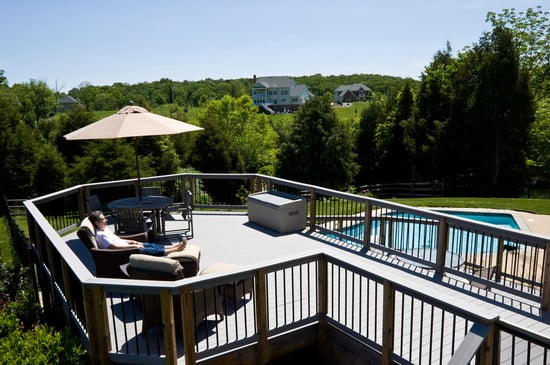Two common ways many people choose to heat their pools are with heat pumps or solar powered systems. A heat pump pool heater functions differently than a solar heater. It has a much higher lifetime cost, but it has some benefits. Knowing the differences between the two can help you choose the best option for heating your pool. The following article lays out the diversified features of each to help you make a more informed decision.
How They Work
Heat Pump: Heat pumps use electricity to transfer heat from the environment to your pool. The most popular type of heat pump is an air-source heat pump, meaning it gets heat from the ambient air. Heat pumps can heat your pool with less energy than gas or resistive heaters when the air is warm or cool. They become less efficient or ineffective when air temperatures get too cold (e.g. below 50F). Much like solar systems, heat pumps can be used in reverse during hot summers to cool the pool.
Solar: Unlike heat pumps, solar powered pool heaters do not require a fan and a compressor to heat the water. These systems utilize the pre-existing pool pump and free energy from the sun. The pump first pushes water through the filter to block any debris from traveling through the pipes. With no extra effort, water flows through the pipes and up to the solar panels where the sun has already heated the lining. The warmed pool water then flows back down the lines and returns into the pool. Valves control the flow of water, so when it’s raining or when the desired temperature is reached, the water flow stops circulating through the solar panels and flows directly back to the pool.
Cost
Heat Pump: Based solely on the description of how the system operates, you might already be guessing that the cost to run a heat pump is more than the average electric bill. And you’re right. Because it requires a significant amount of energy to keep the extra pump running, the cost of operation can range anywhere from $700 to $2,500 annually without the help of a pool cover. The initial cost to install them is pretty pricey as well. For the product and installation, costs usually range between $3,000 and $5,000.
Solar: The only large sum you’ll run into with a solar pool heater is the initial cost of installation. These prices look similar to those of the heat pump pool heater, usually ranging between $3,000 and $6,000. However, this amount is quickly paid off because there is almost no cost to operate the system. Because it runs off the existing pool pump, and solar energy is free, you’ll see little to no rise in your energy bills. If your circulation pump needs to periodically run longer than usual, your energy bills will go up a few dollars per month. This is much more reasonable than the annual cost of a heat pump.
Maintenance
Heat Pump: With regular maintenance, pool heat pumps shouldn’t require much attention from the professionals. However, they are more likely to break than other types of heating systems because they have many electrical components. The fan and compressor that power the whole system are more susceptible to failure because they have moving parts. These also happen to be very expensive components and heat pumps have limited warranties for the first few years.
Solar: Solar heating systems require little to no maintenance after installation. The polypropylene panels are UV protected and resistant to pool chemicals. They don’t move and don’t require any electricity, so they are less likely to require special attention. Warranties on good quality solar systems cover parts and labor for 12 years, plus a limited lifetime warranty. Most systems last for 15 to 30 years.
Now that you’ve learned some key differences between heat pumps and solar heating for pools, your pool heating decision will hopefully be made with ease. Keep in mind that solar heating panels can also be used for the reverse effect; they can be run at night to cool down your pool during hot summer months. There doesn’t seem to be a question as to which one has the best benefits.
If you’d like to know more about solar heating systems for your pool, the team would be glad to help you. Visit our contact page here to get started.